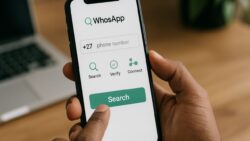Block Scam Calls – South Africans are increasingly turning to WhosApp.co.za to fight the surge of nuisance and fraudulent calls, and the reason is simple: smart caller identification, instant community reports, and one-tap blocking work better together than any manual “ignore” strategy. Our platform helps you verify unknown numbers in seconds, flag high-risk callers, and build trusted lists so your team, family, and clients stay protected. This approach complements national awareness drives by bodies like the South African Police Service and banking fraud units, which warn that scammers often spoof local prefixes to gain trust. By combining live spam signals with user feedback, WhosApp keeps your phone quiet during the workday and alert only when it matters—without sharing your personal contact book or flooding you with ads. And because many scams evolve quickly, our database updates constantly, helping you identify fake “banking verification,” “delivery reschedule,” and “tax refund” calls before you pick up. Try it free, stay safer, and help others by reporting bad actors you encounter.

Why blocking matters in South Africa’s current call-fraud climate
Call fraud has grown more sophisticated, from impersonation of bank officials to courier and SIM-swap social engineering. Industry and government guidance consistently urges citizens to verify unexpected requests, never share one-time passwords, and report suspicious numbers. For context on regulatory oversight and telecommunications rules, see ICASA, which sets communications standards, and the Information Regulator’s POPIA guidance on protecting personal information. Banking-related scams are tracked by the sector’s risk bureau; review alerts and safety updates from SABRIC. Broader consumer-protection advice and complaint processes are outlined by the National Consumer Commission (NCC), while the South African Police Service (SAPS) provides guidance on reporting criminal activity. When you use WhosApp’s blocklists and live warnings alongside these official recommendations, you cut exposure to social-engineering tactics and reduce time wasted on spam.
 South Africa’s Trusted Number Lookup Tool – Identify Callers and Access User-Reported Insights
South Africa’s Trusted Number Lookup Tool – Identify Callers and Access User-Reported Insights
How WhosApp helps you identify, report, and block scam calls—free
WhosApp’s goal is to make number-checking as quick as a glance. Paste or search an unknown number to see a community-driven risk score, recent user tags (e.g., “banking scam,” “insurance sales,” “delivery spoof”), and reporting history. If it’s suspicious, add it to your blocklist in one tap and share an anonymised report so others benefit. You can also star “trusted contacts” so important calls (schools, clinics, clients) are never silenced. Our system looks at patterns like repeated short rings, mass-dial behaviour, and surges in reports to surface likely threats fast. As you apply standard security guidance—verifying directly with your bank via official channels listed by SABRIC, following privacy practices under POPIA, and staying alert to new tactics—you turn WhosApp into a powerful daily filter. The result: fewer interruptions, stronger personal data habits, and a safer calling environment for everyone who contributes.
Smart habits that pair well with real-time blocking
Technology is strongest when paired with disciplined habits. If a caller pressures you to act immediately, hang up and contact the institution using verified numbers from official sites (banks, insurers, retailers). Be cautious about sharing ID numbers, addresses, and OTPs; legitimate agents will not ask for sensitive details over unsolicited calls. Review the ICASA site for updates on numbering, porting, and caller-ID expectations, and bookmark the SAPS portal for reporting guidance. Marketing opt-outs can also reduce unwanted sales calls—see the Direct Marketing Association of Southern Africa’s Opt-Out Register. To understand broader spam trends affecting South Africans, international datasets (e.g., periodic insights from Truecaller Insights) can be helpful. Within WhosApp, keep your trusted and blocked lists fresh, and use our reporting tools to flag any new scam scripts you encounter.
Get started now—verify numbers, contribute reports, and help others stay safe
Starting with WhosApp is quick: look up a number, review its risk markers, and choose to block or trust based on transparent community data. If you’ve received a suspicious call, add a short tag describing the script (“courier fee,” “SARS refund,” “SIM-swap attempt”) so neighbours, colleagues, and small-business owners can recognise it instantly. Cross-check sensitive requests against official guidance from the NCC and SAPS, and keep personal-information handling aligned with POPIA. For telecom policy and consumer updates, monitor ICASA. The more people who verify numbers before answering—and the more reports added—the harder it becomes for scammers to recycle the same tactics. Try WhosApp free today to quiet spam, protect your privacy, and make South Africa’s phone lines safer, one verified number and one blocked call at a time.







